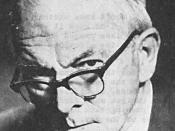Biblical Influence
Cry, the Beloved Country, written by Alan Paton, is a story of hope, forgiveness, and suffering. We see in this novel, that Paton offers hope, and allows a peace of mind and soul, not absent from pain and suffering, but in the midst of them. People spend their whole lives trying to escape the suffering in this world, but it is an impossible task to achieve. "For [the Lord] knew that there is no life without suffering" (261). This observation, however unsettling, is commonly found to be true.
If hope and forgiveness are two of the pillars of life, then they must come hand in hand. To forgive a person requires the state of mind where the forgiver, hopes that things will be better next time. To forgive is truly a daunting task. There are two forms of forgiveness, temporary and eternal. To be able to forgive someone, one must know what it is like to need to be forgiven.
Kumalo knows what is like to forgive, "Who am I not to forgive?" (61), and once he returns to Ndotsheni, he needs forgiveness. Jarvis is aware of Kumalo's guilt over the "inkosikazi's" illness and by saying to Kumalo, "You should know that my wife was suffering before we went to Johannesburg" (296), Jarvis shows his "saint-like" qualities. Kumalo can now begin to forgive himself for not reaching Absalom in time, all because of Jarvis' kindness. Jarvis did forgive Kumalo, but he will never forget. True forgiveness must be eternal, for this to happen, no grudge can be held, the matter is completely forgiven.
In the same way, hope is the very emotion, which keeps the planet spinning, and people living. To hope for something, requires a certain amount of faith in whomever, or whatever, one is hopeful...


